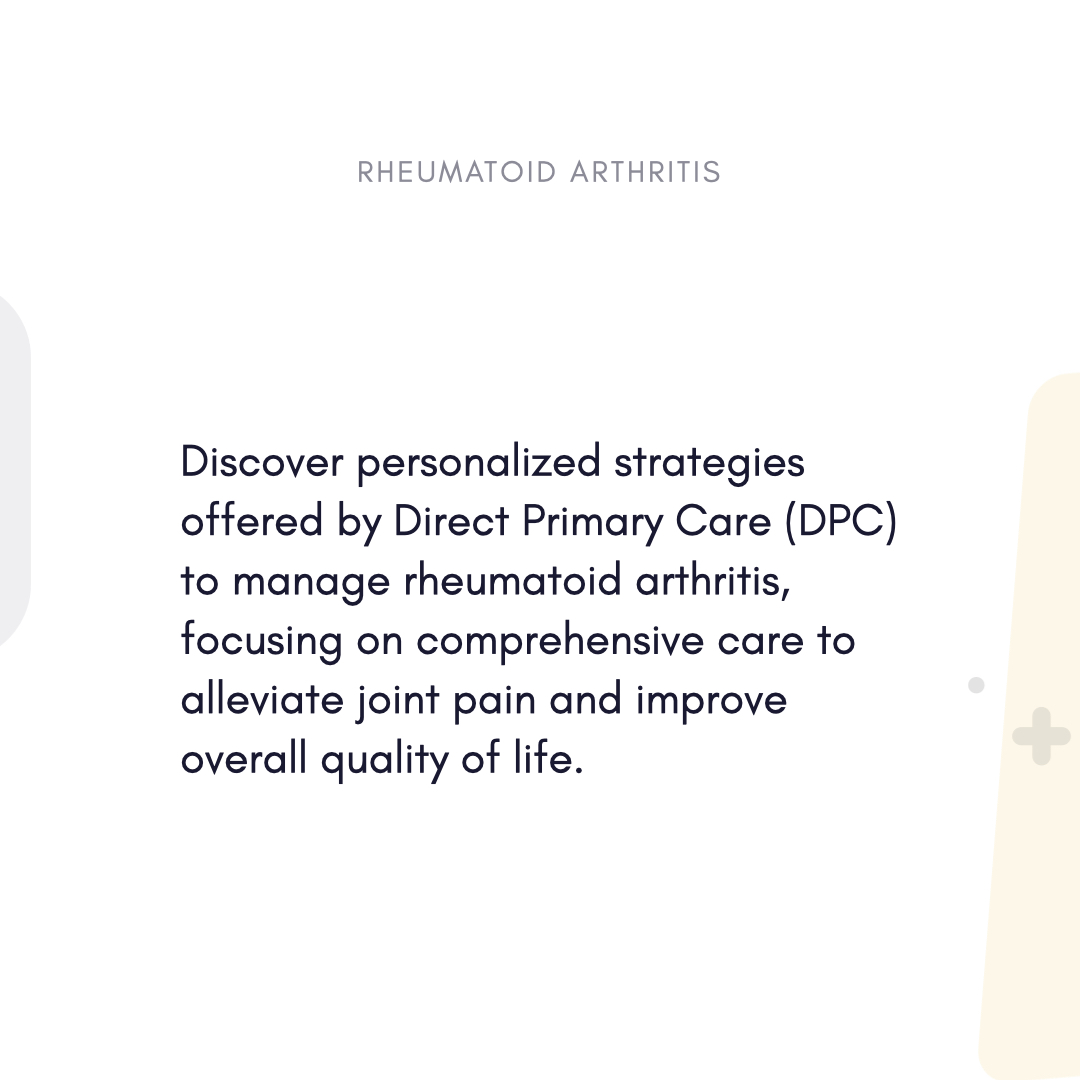Rheumatoid Arthritis and Direct Primary Care (DPC): Personalized Care to Reduce Pain and Preserve Joints
Morning stiffness spanning several hours. Like overfilled balloons, joints were swollen. For 1.3 million Americans with rheumatoid arthritis (RA), this autoimmune attack is not only agonizing but also an unrelenting threat to independence. Although conventional treatment runs through DMARD changes quickly, there is hope: direct primary care (DPC) offers a proactive partnership to reduce inflammation and shield your joints.

Comprehending Rheumatoid Arthritis
RA is a systemic autoimmune condition producing:
- Joint inflammation symmetrically (hands, wrists, knees)
- Morning stiffness greater than one hour
- Rheumatoid nodules, fever, tiredness
- Additional-articular effects: Lung, heart, eye contact
Risks addressed: Joint malformation, osteoporosis, handicap Early, aggressive treatment is stressed by the American College of Rheumatology as a means of preventing permanent damage.
DPC Transforms: How RA Care
Operating on a membership model usually ranging from 100 USD to 200 USD per month, Direct Primary Care (DPC) provides unlimited access to your doctor for a set fee. This means no co-pays, no prior authorization delays, and a care plan as dynamic as your disease for RA patients.
1. Fast diagnosis and early intervention
The easily available DPC model guarantees:
- RA confirmation by same-day RF/anti-CCP testing.
- Imaging coordination: ultrasound or MRI for early synovitis diagnosis.
- Immediate DMARD starts: folic acid + methotrexate in few hours.
2. Individualized, Guideline-Based Treatment
DPC doctors design customized plans compliant with ACR recommendations:
- Mild RA: NSAIDs and hydroxychloroquine.
- Biologics (TNF inhibitors, JAK blockers) with prior authorization support a moderate-severe level.
- Management of comorbidity: CVD risk reduction; osteoporosis screening.
3. All-encompassing, reasonably priced assistance
DPC lowers physical and financial burden by:
- Cutting prescription costs: For methotrexate, wholesale pricing is 10 USD instead of 100 USD.
- 24-hour telehealth availability: controlling side events or flares.
- Integrative treatments call for turmeric, omega-3s, and acupuncture referrals.
DPC Benefits for RA Patients
1. Unmatched Accessibleibility
- Consult 24/7 during unexpected flare or injection reactions.
- No waiting for steroid tapers or rheumatologist referrals.
2. Individualized Interventions
- Seronegative RA: synovial biopsies guided by ultrasound.
- Planning a pregnancy: Leflunomide washout and safe DMARD transitions.
3. Open and Reasonable Cost
- Membership consists in consultations, labs, and care coordination—no hidden costs.
- Typical savings: 5,000 USD+ yearly by skipping biologic mark-ups and ER trips.
Personal Success Stories from Real Life
- Case 1: Emma, 45, went into remission with early DPC adalimumab use. Joint damage stopped; now hiking pain-free.
- Case 2: DPC coordinated pulmonology treatment for 60-year-old Raj who had lung problems. ILD and RA steadied.
Inquiries: RA and DPC
- Q: Can DPC manage difficult situations requiring biologics?
- A: Sure. DPC oversees prior authorization, runs infusions, and tracks for TB/reactivation.
- Q: Without insurance, is DPC reasonably priced?
- A: Perfectly true. Members avoid 1,500 USD+ rheumatology visits and save seventy percent on methotrexate.
- Q: And what about alternative therapies?
- A: DPC combines as extras anti-inflammatory diets, CBD oil, or tai chi.
Why DPC Wins for RA Patients?
Emphasizing DPC's alignment with RA guidelines, the Arthritis Foundation supports:
- Treatment to-target approaches help to maintain low disease activity.
- Tools to monitor joint counts and degrees of tiredness help empower you.
- Trust: A team that is consistent replaces scattered, impersonal treatment.
Take back your life from joint pain.
Rheumatoid arthritis does not have to rob your mobility or happiness. Every step of the road, DPC helps you to find a partner who listens closely, treats aggressively, and walks with you toward remission.






